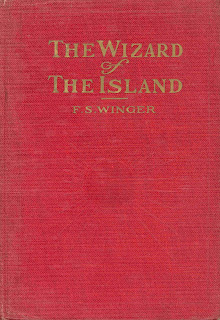F. S. Winger (b. Clay Lick, Pennsylvania, 24 January 1865; d. Chicago, Illinois, 5 March 1936)
Frank Stover Winger was the second of five sons of Elam Buckwalter Winger (1837-1904), a merchant, and Barbara Elizabeth Stover (1841-1891). Around 1889, in Chicago, he married his cousin May Porter Stover (1873-1944), the daughter of the wealthy Daniel Stover (1839-1908), who manufactured many things including a full line of Stover-brand gasoline engines, and the famous Henney buggy, from Freeport, Illinois. Frank Winger and his wife would have one daughter, Clare M. Winger (1891-1968), and one son, Stover Carl Winger (1893-1969). Under her married name, his daughter Clare Winger Harris became a pioneering woman writer of science fiction. Sometime around the beginning of World War I, Frank and his wife divorced, and later Frank married Emma May Finfrock (1871-1950), the widow of Louis Price Bennett (1866-1915) and mother of three adult sons.
Frank Stover Winger's only known writing is the short "pseudo-scientific novel," The Wizard of the Island or The Vindication of Prof. Waldinger (Chicago: Winger Publishing Company, 1917), which was presumably self-published, as there is no record of any other publication put out by the Winger Publishing Company. The novel is dedicated to the memory of the author's older brother, Oswalt Emmert Winger (1862-c.1910?), from whose middle name is derived the surname of the character Jack Emmert. Set a hundred years in the future, Professor Waldinger, who disappeared ten years earlier, had rejected atomic energy. On a small volcanic island in the south Pacific, Waldinger developed steam power so as to regulate the flow of the ether. As his former rival Professor Turner flies nearby in a giant aircraft (piloted by Jack Emmert), Waldinger brings the plane down to show off his accomplishments. Later, the volcano explodes killing both Waldinger and Turner, so that Waldinger's discoveries are lost, but Waldinger's daughter and Jack Emmert have escaped with their lives.
E. F. Bleiler gives a lengthy description of the plot of the novel in his Science-Fiction: The Early Years (1990), concluding accurately that it is "amateurish." Perhaps the primary quality of the book is that it may have been a source of inspiration for Clare Winger Harris's early interest in science fiction.

No comments:
Post a Comment